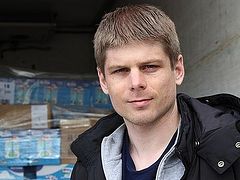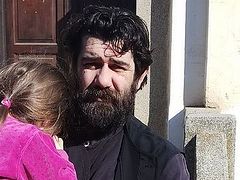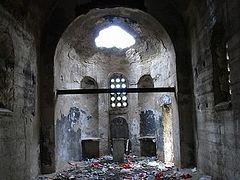“The Ghetto”—that’s what, with a touch of sad humor, the people of Orahovac in Kosovo and Metohija call their town. Divided into two parts—the Serbian and the Albanian—the town really gives no cause for joy. Nevertheless, the Serbs who live there not only keep calm but also keep hope and faith in Christ, without which, as they say, life is meaningless. As a confirmation of our brothers’ faithfulness to Christ and their desire to live peacefully in their native land we offer our readers several accounts of Dejan Baljosevic, who lives in the Serbian enclave.
 Orahovac. The Serbian enclave.
Orahovac. The Serbian enclave.
“I’ll give you a rap on the knuckles”
Once before the International Day of the Disappeared, which is on August 30, I was charged with the task of making a list of families from Orahovac who had lost their loved ones during the war and occupation. These people were to go to Gracanica Monastery for the event, dedicated to the memory of the disappeared, in a coach accompanied by the International Committee of the Red Cross. The event was as sad as the occasion for this meeting of Kosovar Serbs.
I opened the list of the Serbian part of Orahovac (the town is divided into the upper, or Serbian, and the lower, or Albanian, parts) and with the help of my colleagues began writing down the details of the families where a father, brother, daughter, or son had disappeared in recent years… It was terrible, all the more so because we knew all of these people if only in passing, would greet them, talk to them, work, play and study with them… They had been our kinsmen, friends, acquaintances, schoolmates…
The work went slowly. As we, the ones who had stayed in Orahovac, looked at the ever-growing list, we kept praying and thinking of our disappeared fellow-townsmen. Were they still alive despite everything? If they were killed, then where? Who buried them and where were their graves?
At that moment Vitko Stolic burst into our room, and immediately we saw that he was incensed. He had filed an application to receive social aid several days before but his application didn’t meet the required criteria, so no social aid would be paid to him.
“What are you doing?” he fired off angrily. Seeing me at the computer, he was even more furious.
“As you can see, I’m drawing up a list,” I replied.
“Come on! Make your list! But I won’t be included in it, right?!”
I looked into my computer and saw that, thank God, no one with the last name “Stolic” figured in that terrible document. I decided to relieve the tension and said,
“May your surname never appear in this list by the help of God!”
Vitko flew into a rage:
“I’ll give you a rap on the knuckles! May God forbid that your name and the names of all your kin ever be in this list either!” he bellowed.
Then he turned around, left and slammed the door, making the walls shake.
My co-workers and I exchanged glances and then burst out laughing. Indeed you wouldn’t want anyone to be on such a list. Though we didn’t laugh for long because the subject is far from amusing.
The shortest interview
After the war, when I represented the interests of the Serbian community in our area, in line with my duty I had to give many interviews. Though I don’t remember everything, one interview stuck in my memory both because of the mixed feelings it left and its length. The fact is that it ended without actually beginning.
One day a Dutch journalist arrived in the Serbian part of Orahovac—a town divided into two by barbed wire. Though young and pretty, for us Balkan people she (the journalist) looked too skinny, and our Orahovacians would call her “weak-blooded.” But it doesn’t really matter.
She introduced herself politely, sat down at the table, took out a notebook with questions and a voice recorder from her bag and switched it on.
“I’ve got a few questions for you,” she said.
“All right. Let’s start,” I replied, expecting the usual questions related to the life of the Serbian community after the war.
“Question one. When did the Serbian Army occupy Kosovo?”
“Sorry, I didn’t understand your question…”
She repeated her question louder. The interpreter was bending over backwards to pronounce it as clearly and articulately as possible, probably thinking that I was hard of hearing.
That had rather bored me and I answered the question with a question:
“Would you be so good as to answer me: When did the Dutch Army occupy Holland?”
I had difficulty remembering all the provinces of the Netherlands, but I wanted to draw a parallel between it and Serbia with Kosovo as a constituent and integral part of the same country.
“I didn’t get your question,” the journalist was nonplussed.
“But dear madam, how can we carry on a dialogue if we don’t understand each other from the very beginning?” I said.
“Well then, you are right,” she announced, putting her things from the table into the bag and giving us a cynical, mocking grin before leaving. We interpreted it as something like: “You Serbs really are a stupid nation and there is no sense in talking to you whatsoever.”
The lady with her interpreter then made for the Albanian part of the town, where she was sure to find excellent interviewees who must have been eager to tell her about the “vicious and nasty Serbian invaders”, completely in line with the clichés and bias of Western propaganda towards our nation and Kosovo and Metohija.
The last game of dominoes
To get over the despondency and hopelessness of their isolation the Kosovar Serbs in which found themselves after the war, and to feel if only a little joy and hope, we would try to entertain ourselves in Orahovac, for example by playing dominoes.
A large and merry team of the elderly and old, who would arrange their domino matches in the square in front of our church, was the most interesting, active, and rather noisy company. Their domino battles would start early in the evening when the old people gathered at a decrepit table, sat down on the benches around it, and took their domino sets out of the boxes.
Young people, including me, would often stand behind the players’ backs, trying through jokes and funny catch phrases to cheer up the grandpas and grannies who would get carried away and sometimes lose their self-control. The noise and loud laughter would attract the attention of the German Kosovo Force soldiers, who would cast an occasional glance at the cheerful company from their tank, which stood in the square in front of the church as well. They were probably struggling to understand “what these wild Serbs are up to again.”
 The Church of the Holy Theotokos in Orahovac.
The Church of the Holy Theotokos in Orahovac.
It was amusing yet sad to observe flushed pensioners (who kept complaining that their hearing aids worked badly and fell out every now and then) trying to make out the number of dots on the dominoes and their color. Now they would put their hands to their noses, but then —stretch their arms out with a domino, assuring those around them that they could see “better than any young eagle.” Some of them resorted to cunning: they would beckon to one of us young men, and in a loud whisper ask us to tell them the number of dots on their domino. We young guys would often trick them shamelessly and then the game turned into a real battle: one grandpa would declare that he had won, but another would shout: “No cheating! I’m the real winner!” And all of that was accompanied by our loud bursts of laughter and under the fixed gaze of the German soldiers in the tank.
Among the players were those who after leaving their long-occupied place had since come back to their families and friends—it was very hard for them to live in another part of Serbia, even though it is the same country. So they returned. Just as it is impossible to transplant an old tree to a new location, so is with old people. Our elderly felt and knew that it would be better for them to meet the end of their lives at home. Seeing that, young people treated them with deference.
It should be said that humor didn’t die even in the most difficult years—it helped many of us bear the pain and injustice. Though it gradually became gloomy, as did the times. Thus, the area where our old people would play dominoes was at someone’s initiative called, “the elephants’ cemetery”, while the elderly were dying—quietly, meekly and often lonely.
One day we sent our schoolchildren off on an excursion. The coach with the children was guarded by armored personal carriers—a common sight for Kosovo. When they left and the hubbub of the parents who had seen their children off died away, one of the old people (most likely by agreement with his companions) shouted in my direction:
“Hey, Dejan, listen! When are you going to get up an excursion for us old people? Say, to a resort? It’s easy for the youngsters because their whole life’s ahead of them. But we’ve been forgotten by everybody and you never organize anything for us!”
“You say I don’t organize anything? You can see, I’m doing up the cemetery for you!” I shouted and pointed to the churchyard where restoration work was under way. And I was proud of my answer, believing my joke would start the parents and youngsters in the square laughing. But once I saw the faces of the old people, no trace of my pride or humor was left. It was then that I held my tongue, cursing my lack of restraint and foolishness, though it was too late!
The old people didn’t say anything to me; they just looked at me and the cemetery in silence (I remember that gaze very well!) and went on playing.
Sometimes their team would be renewed—one of the old players would fall sick and be replaced by someone else. Later the sad funeral toll would announce the death of the old participant. They were buried in that same cemetery, just over thirty yards away from their domino battles.
In many cases their children and other relatives weren’t even present at the funerals. Many were afraid to travel to Kosovo and Metohija—and their caution was quite justifiable at that time. Later they would come and sell the houses built by their great-grandparents to Albanians. And the seat at the table of each departed player would be occupied by another elderly person.
Now, many years later, when I walk along the deserted streets of the once-Serbian Orahovac, worn out and exhausted due to the uncertainty of the future of Kosovo and the Serbs, I often look at “the elephants’ cemetery”, recalling with anguish the inspiring faces of our old people.
For some reason it doesn’t make me laugh anymore. I am waiting for my turn. Waiting for the moment when I sit down on the old bench and play my last game of dominoes.
***
Dejan Baljosevic was born in 1966 in Prizren. An engineer, before the 1999 war he worked for Yugoslav manufacturing enterprises in Kosovo and Metohija. Together with his family he resides where he lived before the war. This has been the Serbian enclave since Orahovac was divided into Serbian and Albanian parts. He is a member of a public association that aims to organize, normalize and stabilize the life of Serbs in the area. He works in the community of Orahovac as a coordinator for projects, and as a commissioner for refugees and migrants. And, like all other Serbs, he looks forward to a resolution to the problems of Kosovo and Metohija.
P.S. Dear readers, we are continuing the initiative to support Kosovar Serbs, along with churches and monasteries in Kosovo and Metohija. If you are willing and able to contribute, here is the Sberbank card number which your donations can be transferred to:
5469 0177 0923 5086 (Recipient: “Петр Михайлович Д.”). A “Help for Kosovo” note is required.
For our readers outside of Russia, you can also donate to the Vysoki Decani fund for help to Kosova and Metohija.





